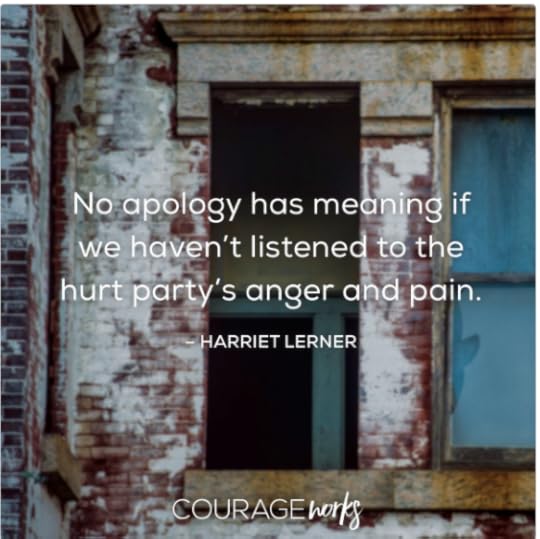Is There a Roadmap to an Effective Apology?

Photo courtesy of CourageWorks.
A few weeks ago, my 26-year-old son (who helps manage our family business, which is about 5 miles from our house) stopped by to grab a quick lunch. Since he does not live at home anymore, I popped into the kitchen from my home office to spend a few treasured minutes with him. We started discussing something, and suddenly the two of us were in a verbal fender-bender, with him holding strongly onto his opinion, and me very sure about mine. I was in the middle of a sentence, when he started walking out of the house.
I didn’t want him leaving while he was upset, so kindly, with a good intention, I calmly said, “I’m sorry that we don’t agree on this, but I really believe that you need to listen more open-mindedly. We can discuss this, but if you want to walk away, it’s your choice.” When I heard the garage door close, I knew that he was not ready to talk any more. But I felt I had done my part; I had even apologized!
That evening over dinner, my husband said to me, “You know your son is upset at you.”
“I know,” I said. “We’ll talk about it tomorrow or when he’s ready. It’s not a big deal. It was a minor disagreement.”
“Well, you’re not going to like what he said to me,” said my husband.
“And what was that?” I asked, somewhat sarcastic.
“He said, ‘How come Mom never apologizes?’”
My heart sank! “What? I’m the queen of apologies,” I said.
“That’s what I told him: ‘Mom always says she’s sorry when she’s wrong. Always!’ To which he responded, ‘She might say she’s sorry, but I don’t think she means it.’”
That threw me into a tailspin! Why would I say I was sorry if I didn’t mean it?
This was weighing heavily on my mind. After all, I teach mindful parenting, and encouraging parents to apologize is an important part of what I advocate. So why did my son feel this way! After taking a few minutes to quiet my unsettled emotions, I called my son.
“But I apologized, love,” I said, defending myself.
“Sure,” he replied. “You said you were sorry, but you said it as if it were still my fault.”
We eventually sorted things out, but I just couldn’t get the argument out of my mind. Obviously he didn’t feel my apology. How could I have said it differently?
We’ve all experienced this kind of bafflement: We apologize, but the volcano continues to erupt. I knew I had to explore this some more.
I got caught up in other things over the next days. Then a good friend of mine sent me this link based on Harriet Lerner’s book, Why Won’t You Apologize. I was thrilled! This e-course just happened to be based on one of my favorite author’s work and hosted on one of the most respected growth platforms, Brené Brown’s Courageworks.
There’s an old saying: “When you yearn for something from the core of your being, the entire Universe aligns itself to manifest it for you.” Yes, this was definitely for me. So I jumped in head first, and in just five lessons, I emerged as a much wiser apologizer! At the same time I decided to read Harriet’s book, which gave me some valuable added insights.
The course begins by touching on the three gifts of a heartfelt apology:
A gift to the person we hurt: A heartfelt apology makes them feel soothed and calmed, releases them from repetitive obsessive anger, allows them to feel safe and comfortable in the relationship, makes them feel that they matter, validates the hurt party’s sense of reality, and sends a message that I get it, I screwed up.
A gift to self: A heartfelt apology makes us feel more respected and able to grow in resilience, happiness, maturity, and integrity.
A gift to the relationship: A heartfelt apology affects our intimacy, deepens our connection, communication, and joint growth.
It’s hard to hold your heart in your hands. You have to actually get ready to face your shame, vulnerability, guilt, and remorse. This course outlined the steps to do that through easy, day-to-day examples and role-playing.
In one lesson, Harriet and Brené discussed a topic dear to my heart: Why kids don’t learn to apologize. The answer is because parents haven’t modeled that behavior. It is important for all of us to learn the Nine Essential Ingredients to a “true” apology. My two favorites are:
# 5. A true apology doesn’t get caught up in who’s more to blame or who started it.
#8. A true apology should not be offered to make you feel better if it risks making the hurt party feel worse.
The latter particularly resonated with me because I always followed my apologies with the reason why I did what I did.
Clearly, I’m not sharing all the essentials I learned, because I really want you to take this life-changing course!
Paired with apology challenges and worksheet questions, this course covered a lot of ground in a simple and heartwarming way. It offered deep perspectives not just on how to give an apology but also on how to receive one. As I practiced the tools, I came to agree completely with Brené’s words: Apologizing is a function of self-respect and self-worth. There is an art to a giving an effective apology and to receiving one.
I can’t tell you how much this e-course meant to me. I truly believe it’s is a must for all of us. So sign up now! And let me know what you think. Register HERE.
The post Is There a Roadmap to an Effective Apology? appeared first on Tools of Growth.



